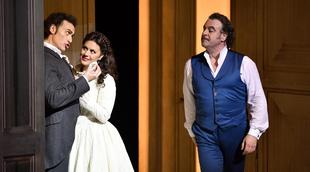 © (c) Antoni Bofill
© (c) Antoni Bofill
It has often been said, in a variety of ways and with a range of argumentations, that Don Giovanni belongs to the limited group of ‘impossible operas’ or ‘trap operas’ in the sense that they are so big, perfect and powerful, and their deep subject – rather than their superficial plot – is so transcendental that, on one hand they are almost always bigger than their performers, and on the other hand they also generate such perfection expectations in the audience that they end up being invariably disappointing.
This is exactly the sentiment that was left in the spirit at the end of the first of ten performances of Don Giovanni that will take place at Liceu until the beginning of July. The staging, a co-production of Liceu, Covent Garden, The Israeli Opera and Houston Grand Opera, which has only been seen in London so far, is signed by Kasper Holten. Visually, it consists of an enormous gyratory cube full of stairs and doors that represent more or less the labyrinthine palace of the protagonist. Projected on the cube throughout the performance is a video which is more effect driven than meaningful. Essentially, it brings visual ‘noise’ to the performance in a non-pertinent –and therefore impertinent– way and it turns out to be more of a nuisance than a contribution.

Don Giovanni © Antoni Bofill

Don Giovanni © Antoni Bofill
Another serious problem of this production is in the dramaturgy in general and in the treatment of the characters, in particular in how they interrelate. The original score of Don Giovanni indicated that the piece is a ‘dramma giocoso’. Holten not only forgets the ‘giocoso’ part of this ‘dramma’ but also alters the characters gravely. We have for over 200 years suspected – because Mozart tells us subtly through his music – that Donna Anna feels powerfully attracted to Don Giovanni. We didn’t need it explicitly portrayed on stage.
In this kind of production it is clear that the final moralising sextet following Don Giovanni’s death is redundant. During the Romanticism, so fond of catastrophic endings, sometimes it was simply eliminated. Holten doesn’t dare doing this and attempts to solve it by having if sung from the orchestra pit whilst Don Giovanni, now totally immersed in delirium, looks at us from the stage. This is not a good solution as it distorts the original piece.
In favour of this production are the idea of presenting the ending of Don Giovanni trapped by the ghosts of his own mind, unable to distinguish between reality and desire, and the good theatrical solution of the difficult scene of the dinner invitation to the statue of the Commendatore.
Musically, although the performance went from less to more, it didn’t achieve the excellence of the piece itself. Josep Pons, the conductor, ended well but at the beginning the orchestra sounded dry, untied and hard. The concertanti at the end of the first act were not together enough, but instead the scene of Don Giovanni’s banquet reached a very good level.
Marius Kwiecień isn’t just one of the good Don Giovanni of our times because he has the voice, the age, the strength and the energy of the character, but he also integrates perfectly in this production and its dramatic intentions, as he participated in it when it was staged in London. Carmela Remigio was only sufficient as Donna Anna, the voice wasn’t appropriate for the score nor for the character, the projection forced. Miah Persson managed better with the role of Donna Elvira, uncomfortable at the beginning but gained confidence, as most of the other singers, as the performance progressed. Leporello was faced vocally with sufficiency and scenically with the astuteness of the character by Simón Orfila. Valeriano Lanchas delivered with sufficiency but without excellence as Masetto and Eric Halfvarson was dark and decisive, as expected from the Commendatore. The most applauded singer of the evening, along with Kwiecień, were Julia Lezhneva, who sang Zerlina very well and Dmitry Korchak, who did perform excellently the role of Don Ottavio.
When in a Don Giovanni the most triumphant are Zerlina and Don Ottavio it means that something didn’t quite go the right way.
Eventually, we will have to accept that Don Giovanni is perhaps an impossible opera.
Xavier Pujol
the 22 of June, 2017 | Print
Comments